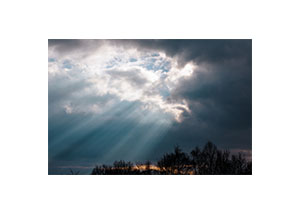One of my more vivid childhood memories has to do with my father on winter, weekday mornings. While it was still dark, Dad would come into the room where my brother John and I slept and would turn on the overhead lights. “Get up, Boys!” he would announce. “Time to get ready for school.” I never minded the basso profundo proclamation, but the sudden influx of light was, I thought, definitely overkill. For crying out loud! If the good Lord wanted us to be roused from sleep by sudden, glaring light, He would not have made the sun rise gradually!
Years later, when I was a newly ordained priest, I happened to come upon a remarkable passage in the well-known biblical commentaries by the staunch Protestant scholar William Barclay. Reverend Barclay, in discussing John 14:2 (“In my Father’s house there are many dwelling places”), had this to say:
“Speaking in purely human and inadequate terms, we sometimes feel that we would be dazzled with too much splendour, if, immediately [after death], we were ushered into the very presence of God, that even in heaven we would need to be cleansed and purified and helped until we can face the greater glory.”
Wow! Here was language I could understand. Just as it would be cruel to bring someone from dim light into sudden brightness, so God would be cruel if, immediately upon death, He were to bring a soul from the shadows of sin and the half-light of grace directly into the unmitigated brightness of heaven. Such a soul must undergo a gradual introduction to greater and greater intensities of light until it is ready for the glory of paradise.
Reverend Barclay was, to be sure, no defender of Roman Catholicism, yet he unwittingly provided us with a very eloquent explanation of one of the most misunderstood teachings of the Catholic Church. The gradual process of post-death preparation that he described is nothing less than what Catholics call purgatory. Purgatory, in other words, is the antechamber of heaven. It is for those persons who die in a state of grace but whose spiritual vision is more or less dimmed by venial sin. It is here that the cataracts of self-centeredness are gradually removed.
There are holy people walking among us who grow in the love of God to such a degree that they need no clarification of their spiritual sight after they die. These souls have allowed the grace of Christ to prepare them fully for the light of heaven. But for those of us whose Christian discipleship is somewhat less than whole hearted, there is purgatory.
November 2nd (All Souls Day) is the time when we pray in a special way for our loved ones who may be in purgatory. Yet, strangely enough, keeping these holy souls in our prayers all year long will help to clarify our own spiritual eyesight and thus lessen our own post-death preparation for the Beatific Vision.
Yes, for those who die in a state of grace but who are not quite ready for heaven, purgatory is indeed light—not the noonday splendor of paradise, but the gradual Son-rise of eternal glory.

